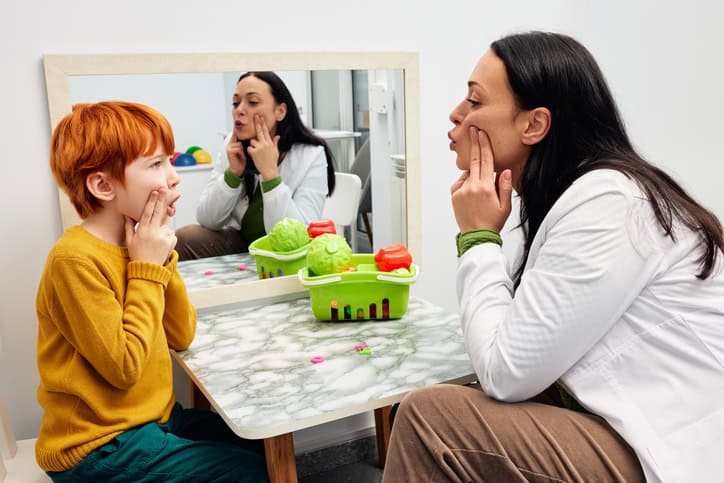Your newborn can curl her hand around your finger immediately, but it can take nearly a year to develop the fine motor skills to use a pincer grasp to pick up a Cheerio. Just like these muscles strengthen and refine as your child grows, it will take time – sometimes years – for your child’s tongue, lips, mouth and facial muscles to develop sufficiently to properly make all the sounds for clear, perfectly understandable speech.
There is a reason most toddlers say “ma ma” first. It’s because that sound, “m”, is one of the first that develop. You may also hear “p”, “h”, “w”, “b” and “n “by your child’s first birthday. If you don’t, there is no cause for alarm; it can take up to 3-1/2 years for your child to clearly enunciate these sounds. Between ages 2 and 4, you may also start hearing “k”, “g”, “d” and “t” sounds.
By the time your child reaches kindergarten, he’ll start using blends, such as “st”, “pl”, and “gr”. For example, “stop” will no longer be “top” and “great” will sound just great, rather than like “gate”. The blends “sh” and “ch” may take until age 7 to accurately develop, saying “shopping” rather than “chopping” when you need to buy groceries. The “th” blend may take up to 8 years to develop, to properly say “thumb” instead of “tum.”
Substituting a “w” for an “l” such as in “wuv” instead of “love” may continue until age 7.
Some sounds present more noticeable problems and continue well into elementary school, such as a lisping “th” instead of a clear “s”, a “w” substitution for “r”, such as “buwd” instead of “bird”, or trouble with “ing” such as “goink” instead of “going”. These sounds are also among the most difficult to form, taking up to 8 years old for all muscles and skills to be strongly developed.
When you are concerned that your child’s speech is difficult for strangers – and sometimes family and friends – to understand, first take your child’s age into consideration. It may just not be time yet for those particular troublesome sounds to be fully developed.
Sometimes, there is cause to intervene – and intervene early. Red flags needing immediate attention are when your child:
- Drools excessively, even when not teething
- Doesn’t use his lips when eating or cannot eat neatly, dropping food from her mouth
- Keeps his mouth open and/or tongue out; an open mouth posture
- Is unable to touch her tongue to her upper lip, or to lick her lips
- Is a mouth breather
- Has difficulty making a “kiss face” or blowing “raspberries”
- Has difficulty blowing out candles, or blowing bubbles
- Cannot bite his lower lip
When you notice these muscular or functional challenges – at any age – it’s best to call Alzein Pediatrics for a full physical exam including a hearing check and a possible referral to a speech pathologist.
Questions about your child’s speech development or want to make an assessment appointment? Call our office at 708-424-7600 or contact us. We are here to serve you and your family!


